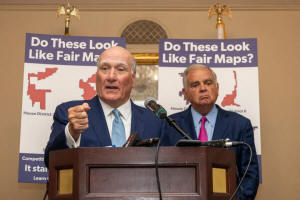Election lawyers, Obama alumni renew Illinois redistricting reform push
[August 20, 2025]
By Andrew Adams
CHICAGO — A group of former Obama administration officials and election
lawyers announced Tuesday they are attempting to reform the way the
state draws district maps for the state legislature. They want to do
this by passing a state constitutional amendment via a ballot initiative
during the 2026 general election.
They say the current legislative redistricting process leads to
overrepresentation of Democrats and few competitive legislative
districts, meaning politicians must do less to serve their constituents.
Former U.S. Secretary of Transportation Ray LaHood, a Republican, and
former Secretary of Commerce Bill Daley, a Democrat and member of the
Daley political family, are leading the effort. Both served under
President Barack Obama, with Daley as his chief of staff.
Former State Board of Elections Chair Bill Cadigan and election lawyer
Michael Dorf, whose past clients include the Democratic Party of
Illinois and several sitting statewide officials, also are backing the
effort.
12-member redistricting commission
The proposal would create a 12-member “Legislative Redistricting
Commission,” appointed by the top Democrat and Republican in each
legislative chamber. Each legislative leader would appoint one member of
the General Assembly and two members who are not lawmakers.
Commissioners would be barred from considering political party
registration or voting history data when drawing maps. Districts also
would be required to be compact, contiguous and drawn along existing
county and municipal lines where possible.

The amendment would only apply to the redistricting process for the
state legislature. It would not apply to congressional districts, which
would still be drawn by state lawmakers.
The amendment would also change the size of the state legislature, so
that if the state’s population significantly increases or decreases, so
too would the number of districts.
This model is based on Iowa, Arizona and Pennsylvania. The Princeton
Gerrymandering Project, which analyzes how severely gerrymandered
states’ legislative maps are, gives Illinois a “B” grade for the state
House and an “F” for the state Senate. Iowa and Arizona received A
grades for their state maps and Pennsylvania received “B” grades.
“I’ve talked to people in Iowa and I’ve talked to people in California,”
LaHood said. “They love the idea that politicians are not drawing their
maps. And if you look at their maps, they’re compact and contiguous. And
people like that.”
[to top of second column]
|

Bill Daley, left, and Ray LaHood, right, speak at a launch event for
their campaign to change how Illinois draws its legislative maps.
(Capitol News Illinois photo by Andrew Adams)

The amendment, according to its backers, will need about 320,000 valid
signatures to appear on the 2026 November ballot. Because some
signatures might be invalid, Cadigan said they’ll aim for roughly double
that.
LaHood said the effort would need “3 to 4 million” dollars, “primarily
to pay people to help us get the signatures.”
Failed 2016 effort
In 2016, the state Supreme Court case threw out an effort to reform
legislative redistricting on a 4-3 vote. The court ruled along partisan
lines that the wording of the amendment didn’t comply with the state’s
constitution’s narrow wording on citizen initiatives.
The Supreme Court now has a 5-2 Democratic advantage after the General
Assembly redrew its district lines in 2021.
The 2016 effort was itself a response to a 2014 court case that tossed
out a proposed constitutional amendment that year.
Dorf said the wording of the proposed amendment takes into consideration
court precedent, but LaHood noted that “no one will predict what the
Supreme Court does.”
Still, Daley said the amendment will hopefully influence the 2026
campaign.
“I think politicians will respond to that when it’s on the ballot for
the general election in 2026. Everyone running — from state rep to the
state Senate, congressional and statewide officeholders — will be asked
the question ‘Where do you stand on the fair maps amendment?’” Daley
said. “And woe with those who don’t say they’re for it.”
The effort comes as Texas considers an unorthodox mid-decade
redistricting in order to expand the Republican majority in Congress,
which has sparked Democratic states like California and Illinois to
consider something similar to counteract Texas’ move.
“As far as the congressional thing is concerned, I fully understand what
(California Gov. Gavin) Newsom is doing and what Gov. (JB) Pritzker has
said he’s considering because of the egregiousness, at the congressional
level, of what’s going on in Texas,” Daley said. “If Texas just played
according to the rules and in five years wanted to do a map to do away
with five Democrats, that’s their right.”
Capitol News Illinois is
a nonprofit, nonpartisan news service that distributes state government
coverage to hundreds of news outlets statewide. It is funded primarily
by the Illinois Press Foundation and the Robert R. McCormick Foundation. |